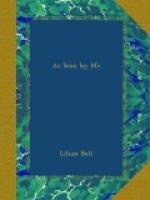Now, the person of the Tzar is so sacred that it is forbidden by law even to represent him on the stage, and as to photographing him—a Russian faints at the mere thought. Nevertheless, we wished very much to photograph this pageant, so we determined, if possible, to take our camera. Everything else that we wanted had been done for us ever since we started, and our faith was strong that we would get this. At first the stout heart of Baron Elsner quailed at our suggestion. Then he said to take the camera with us, which we did with joy. His card parted the crowd right and left, and our carriage drove through long lines of soldiers, and between throngs of people held in check by mounted police, and by rows of infantry, who locked arms and made of themselves a living wall, against which the crowd surged.
To our delight we found our places were not twenty feet from the entrance to the Winter Palace. We noticed Baron Elsner speaking to several officials, and we heard the word “Americanski,” which had so often opened hearts and doors to us, for Russia honestly likes America, and presently the Baron said, in a low tone, “When the Emperor passes out you may step down here; these soldiers will surround you, and you may photograph him.”
I could scarcely believe my ears. I was so excited that I nearly dropped the camera.
The procession moves only about one hundred feet—a crimson carpet being laid from the entrance of the Winter Palace, across the street, and up into a pavilion which is built out over the Neva.
First came the metropolitans and the priests; then the Emperor’s celebrated choir of about fifty voices; then a detachment of picked officers bearing the most important battle-flags from the time of Peter the Great, which showed the marks of sharp conflict; then the Emperor’s suite, and then—the Emperor himself. They all marched with bared heads, even the soldiers.
My companion had the opera-glasses, I had the camera. “Tell me when,” I gasped. They passed before me in a sort of haze. I heard the band in the Winter Palace and the singing of the choir. I heard the splash of the cross which the Archbishop plunged into the opening that had been cut in the ice. I heard the priests intone, and the booming of the guns firing the imperial salute. I saw that the wind was blowing the candles out. Then came a breathless pause, and then she said, “Now!” A little click. It was done; I had photographed Nicholas II., the Tzar of all the Russias!
VII
RUSSIA
Yesterday we had our first Russian experience in the shape of a troika ride. Russians, as a rule, do not troika except at night. In fact, from my experience, they reverse the established order of things and turn night into day.




